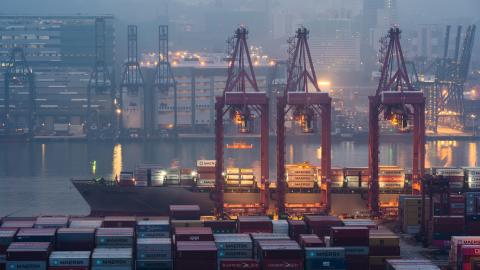At the conclusion of the Cold War, Western leaders embraced the hope that an economically empowered China would gradually but inexorably embrace the gospel of democratic capitalism. More than three decades later, Beijing’s adoption of the transactional and regulatory ethos of the global market economy has proven nothing but a chimera. There is a growing awareness among Western leaders that the health of the world economy now depends upon a complete rethinking of China’s role within it.
The actions of China’s own leaders have induced this rude awakening. Beijing’s enthusiasm for draconian COVID lockdowns, endorsement of Russian belligerence, and aggression toward its Indo-Pacific neighbors have revealed its genuine character. Many who once sought to coax China into the rules-based international system now view it as an economically empowered, technologically advanced, and militarily capable communist state determined to undermine that very system in favor of a new global order centered in Beijing.
To counter this clear and present danger, the twin pillars of NATO have repurposed their national security agenda. Washington now identifies the People’s Republic of China as its primary security threat, while Brussels defines its relationship with the PRC as one of “systemic rivalry.” Furthermore, Beijing’s neighbors are hurrying to strengthen economic, political, and security arrangements tailored to meet the China threat, including the Quad security dialogue, the AUKUS trilateral partnership, and myriad other mutual defense arrangements. Relationships formerly transactional in nature are now explicitly political and ideological.
That China can play a constructive role in today’s global economic order without adhering to the principles of democratic capitalism is an illusion deserving of its rightful place in the dustbin of history. To ensure its permanent placement there, Western policymakers must be guided by an awareness of three immutable characteristics of the Chinese system.
First, China is a non-market economy (NME). To insist otherwise is to willfully disregard reality. As such, all anti-dumping measures and tariffs on Chinese imports are worth considering in the interests of equal opportunity and reciprocity in commerce. For decades Beijing has attempted to manipulate pricing, the value of its currency, and its access to world markets. For decades Beijing has lobbied the WTO and other Western forums for unfair trade and tariff advantages. It is imperative that the West engage Beijing with a full understanding of its NME status, insisting it comply with established international trade regulations and divesting from China if it refuses to do so.
Second, China is a communist country. The state reigns supreme in all economic operations. Constitutionally guaranteed property rights do not exist. China’s enormous economic growth of the past several decades has come almost exclusively from non-state sectors that access the international free trade system at the mercy of the state. But these non-state actors, wealthy as they may be, lack guaranteed legal protection. If the state so chooses, it can gut them in the service of the bureaucracy or of the world’s largest armed forces. Further, Beijing subjects all Chinese businesses to widespread espionage and surveillance efforts, endangering all foreign investments inside China. Leaders of the global free trade system should reconsider engagement with the PRC until it no longer demands compliance with a pervasive regime of espionage and repression.
Third, China desires to create a new global economic system that takes its marching orders from Beijing. Western leaders should not indulge the self-serving fantasy that they can change the fundamental nature of the Chinese government. The only global actor that can ensure China’s participation in a free and fair system of international trade is China. Surrendering to Beijing’s non-market practices and unyielding demands for indefinite concessions is an exercise in poor statesmanship that only impedes the progress of democratic capitalism.
For decades Western leaders embraced the hope that China’s economic potential could be harnessed to serve their own interests. They would do well to remember that their counterparts in Beijing serve only themselves.















